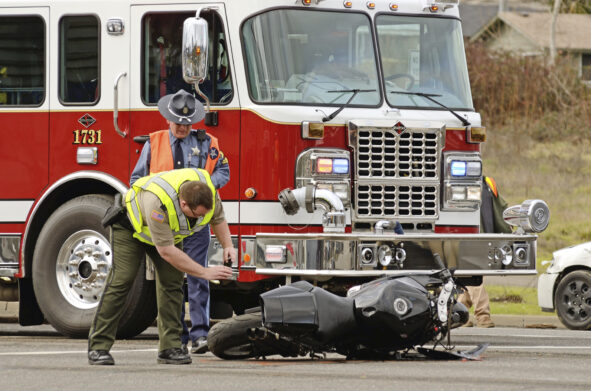Earlier this week, a Los Angeles motorcyclist was injured when he crashed into a man who had jumped from a bridge over the 101 Freeway. The jumper, who was dead at the time of the crash, reportedly stepped off of the bridge to take his own life. The motorcyclist suffered a gash in his leg and other minor injuries as a result of the accident. Even though the man was killed on contact after jumping from the bridge, his estate could potentially be liable for damages suffered by the injured motorcycle rider.
Negligence in Los Angeles Personal Injury Cases
Most personal injury claims are based on the theory that one person’s negligence caused you to suffer an injury. As a result, the negligent party can be held financially responsible for any injuries and harm that you sustain. In California, negligence occurs when:
- One person has a duty to act in a certain way;
- The person breaches this duty; and
- The breach of duty causes you to suffer an injury.
As a general rule, we all have a duty to act in a way that minimizes the threat of harm to others around us. Walking on a pedestrian bridge or pausing to take in the Los Angeles scenery is perfectly fine, as long as it is done safely. Jumping from a bridge, and plummeting to a busy road below, however, is not fine. Jumping from a bridge, knowing that you are likely to land in the middle of a busy freeway, breaches the duty of care pedestrians have when they are on the road. This behavior puts others on the road at an increased risk of harm.
The motorcycle rider who was injured by the Los Angeles jumper will have to establish that the jumper had and breached a duty of care and, as a result, he suffered injuries.
Liability for Los Angeles Accidents
In most cases, an injured accident victim can recover compensation from the at-fault party. What happens when the person responsible for your accident and injuries is dead? Are victims out of luck and unable to recover much-needed compensation? In California, accident victims can pursue compensation from an at-fault party’s estate if that person has died. This is true for situations like the present case, where the at-fault party died at the time of the accident, or for times when a defendant dies before a personal injury case is finalized.
The most important thing to remember if you are pursuing compensation from the estate of an at-fault party is that you must act quickly. The statute of limitations is accelerated in situations like these. In California, the statute of limitations for personal injury cases involving bodily harm is two years from the date of the accident. When the at-fault party is deceased, the statute of limitations is reduced to one year. This means that in order to recover compensation at all, the injured motorcyclist has one year, rather than two years, to file a claim for damages. If he does not file a claim with the jumper’s probate estate within one year of the jumper’s death he will not receive the money he may need.
Limitations on Recovering Compensation From an At-Fault Party’s Estate
In addition to the accelerated time frame for filing a claim, victims may encounter additional limitations when pursuing compensation from a negligent party’s estate. In California, you cannot legally sue a dead person. Instead, claims are filed with that person’s probate estate. Recovery is often limited to the assets and property owned by the decedent prior to their death. In many cases, the total amount of these assets is not sufficient to cover the costs of personal injury claims. In some cases, including those for injuries sustained in Los Angeles traffic accidents, may be able to rely on insurance proceeds to pay necessary damages. However, in situations like the present case, there is likely no insurance policy to compensate for the motorcycle rider’s injuries. As a result, he will probably be limited to the assets of the jumper’s estate.
However, the motorcycle rider will probably not be the only person/entity filing a claim with the jumper’s estate. Creditors – basically anyone the jumper owed money – will likely file claims to recover what they are owed. The probate estate is used to pay creditors for their claims. However, the estate can only pay out what it has. As a result, many claims are not paid in full. In some cases, certain creditors will never receive anything, at all.
While the ability to recover compensation may be limited when the at-fault party is deceased, the money can still be incredibly helpful while you are recovering from an unexpected injury. If you would like to know more about filing a personal injury claim against an at-fault party’s estate, see our guide on finding a good personal injury attorney. Our attorneys know that this is a difficult time in your life and will fight to maximize the compensation you receive. Call us today to set up a free consultation and learn more.

